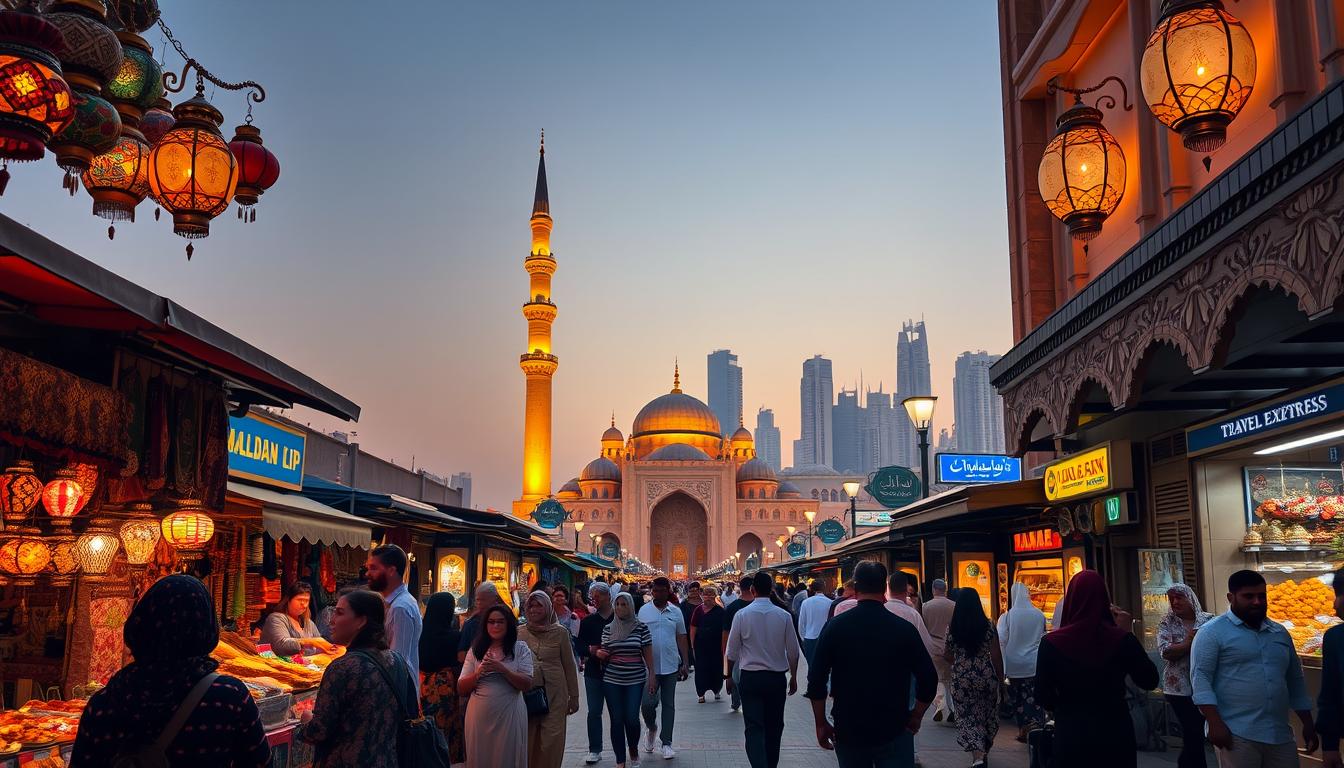Did you know that during Ramadan, Dubai becomes a vibrant cultural celebration? Over 80% of the city’s people fast every day. Your visit during Ramadan and Eid in Dubai will be a special journey into Islamic traditions and spiritual reflection.
Dubai offers a unique chance to dive into a meaningful cultural experience. The holy month of Ramadan changes the city’s vibe. It creates a spiritual and community atmosphere that’s different from usual tourist experiences.
It’s important for travelers to understand local customs and traditions. This guide will help you navigate Ramadan and Eid. You’ll learn how to appreciate and join in with sensitivity and insight.
Key Takeaways
- Experience a unique cultural transformation during Ramadan
- Learn essential etiquette for respectful participation
- Discover special events and traditions in Dubai
- Understand changes in daily city life during Ramadan
- Prepare for an immersive spiritual and cultural journey
Understanding Ramadan in Dubai
Ramadan is a deep spiritual journey in Dubai, rooted in Islamic culture. It changes the city, offering a special spiritual vibe. This goes beyond usual religious acts.
Ramadan is more than just fasting. It’s a time for spiritual thinking, connecting with others, and personal growth. It touches every part of life in Dubai.
Cultural Significance of Ramadan
In Ramadan, Dubai’s culture turns to spiritual practices and unity. The month’s traditions include:
- Daily fasting from dawn to sunset
- Increased charitable giving
- Nightly family gatherings
- Extended prayer times
Muslims see Ramadan as a time for spiritual purification. It’s about self-control and kindness. The month encourages people to deepen their faith and bond with the community.
Moon Sightings and Their Importance
Moon sightings are key to knowing when Ramadan starts and ends. Dubai’s religious leaders watch the lunar calendar closely. This creates excitement in the community.
The moon sighting tradition involves:
- Expert astronomers scanning the night sky
- Official announcements of Ramadan’s start
- Community-wide celebrations
Knowing these traditions helps visitors understand Ramadan’s deep spiritual meaning in Dubai’s Islamic culture.
What to Expect During Ramadan
Visiting Dubai during Ramadan is a unique experience. The city changes in subtle yet significant ways. This offers travelers a chance to dive into local traditions and discover authentic experiences.
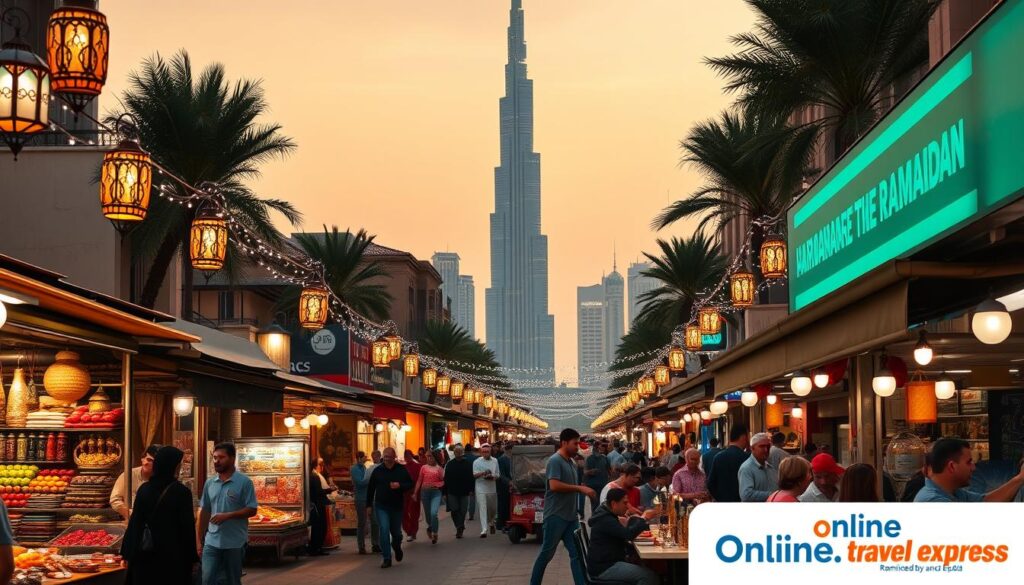
Dubai transforms during Ramadan. The city’s energy stays vibrant, but daily routines change. Visitors need to understand these shifts.
Daily Life Adjustments
Business hours change, and the pace slows down during the day. Many places work shorter hours, like:
- Government offices work shorter shifts
- Restaurants remain closed during daytime
- Public spaces have adjusted schedules
Special Activities and Things to Do
Despite some limitations, Dubai has lots to offer during Ramadan. Visitors can find unique cultural activities that offer deep insights into local traditions:
- Attend iftar gatherings
- Visit Ramadan night markets
- Explore cultural exhibitions
- Participate in community events
Food Availability
Food options change during Ramadan, but Dubai keeps visitors happy. Most hotels and some restaurants serve meals discreetly.
| Location | Dining Options | Timing |
|---|---|---|
| Hotels | Full meal service | All day |
| Restaurants | Limited daytime service | After sunset |
| Food Courts | Screened dining areas | Restricted hours |
Knowing these changes helps you enjoy Dubai during Ramadan. It ensures a memorable cultural experience.
Dining Etiquette During Ramadan
When visiting Dubai during Ramadan, it’s key to know and respect local customs. You’ll find unique practices that make dining special during this holy month.
Ramadan brings unique dining rules that all travelers should know. This month, food and social time have deeper meanings.
Iftar Customs to Understand
Iftar, the evening meal after fasting, is a big cultural moment. Here are some key practices to follow:
- Wait for the call to prayer before eating
- Accept food and drinks as a sign of welcome
- Wear modest clothes at communal meals
Appropriate Dining Practices
Your dining habits during Ramadan should show respect for the culture. Since eating and drinking are banned in daylight, plan your meals wisely.
- Eat in designated areas
- Don’t eat or drink in public during the day
- Be considerate of those who are fasting
Respecting Local Customs
Dubai’s Ramadan customs are deeply tied to its religious traditions. Showing respect means being aware of your actions and the spiritual importance of this time.
Ramadan is a time for reflection, community, and spiritual growth.
By following these dining etiquette tips, you’ll have a more meaningful and respectful Ramadan experience in Dubai.
Experience Iftar in Dubai
Dubai turns into a food lover’s dream during Ramadan. The city’s mix of old traditions and new tastes offers a unique dining scene. It celebrates local culture through food.
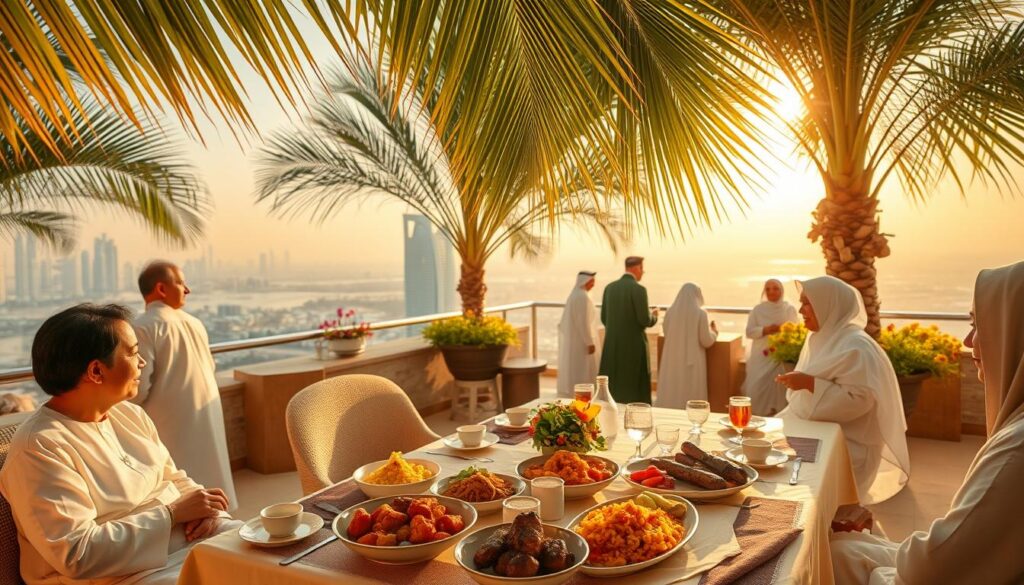
When the sun goes down, Dubai lights up with Iftar celebrations. These gatherings highlight the city’s rich fasting traditions. You’ll find dining spots that mix spiritual moments with delicious food.
Popular Iftar Spots
Dubai has many Iftar places for all tastes and wallets:
- Luxury hotel buffets at Atlantis, The Palm
- Traditional Arabic restaurants in Al Seef District
- Waterfront dining at Dubai Creek
- Cultural centers with authentic meal experiences
Special Offers and Promotions
Restaurants offer special deals during Ramadan. Look for:
- Family group discounts
- Extended dining hours
- Complimentary dates and Arabic coffee
- Multi-course set menus at fixed prices
Traditional Dishes to Try
Don’t miss these Ramadan must-haves:
- Harees – a creamy wheat and meat dish
- Ouzi – slow-cooked lamb with rice
- Umm Ali – traditional bread pudding dessert
- Jallab – refreshing fruit syrup drink
Trying Iftar in Dubai is more than just eating. It’s a chance to dive into local traditions and feel the city’s warmth.
Exploring Ramadan Markets
Dubai changes a lot during Ramadan. The night markets become a key part of the culture. They offer a chance to dive into local traditions and find unique things to do.
During Ramadan, Dubai’s markets buzz with energy. Exploring these markets gives you a real look at local culture and the festive mood.
Visiting Ramadan Night Markets
Night markets during Ramadan are magical. They offer fun activities. Key places include:
- Al Seef Heritage Area
- Zabeel Night Market
- Dubai Festival City
Unique Shopping Opportunities
These markets have special products that show Dubai’s culture. You can find handmade items, traditional textiles, and detailed artwork. These make great souvenirs of your Ramadan visit.
| Market Type | Special Features | Best Time to Visit |
|---|---|---|
| Traditional Souks | Handmade Crafts | After Iftar (Evening) |
| Modern Markets | Contemporary Designs | Late Evening |
| Cultural Markets | Local Artisan Works | Before Sunset |
Souvenir Ideas
Looking for special keepsakes? Here are some ideas that capture Dubai’s Ramadan vibe:
- Handwoven Arabic textiles
- Traditional Arabic calligraphy art
- Artisanal perfumes and oud
- Decorative lanterns
“The magic of Ramadan markets lies not just in shopping, but in experiencing the warmth of local culture.”
Your Ramadan market adventure will be a memorable trip through Dubai’s culture. It offers many activities and things to do, beyond what tourists usually see.
Eid Celebrations in Dubai
Eid al-Fitr marks the end of Ramadan in Dubai, turning the city into a vibrant celebration. It’s a time of joy, unity, and cultural traditions. Families and communities come together, showing the city’s rich cultural events.
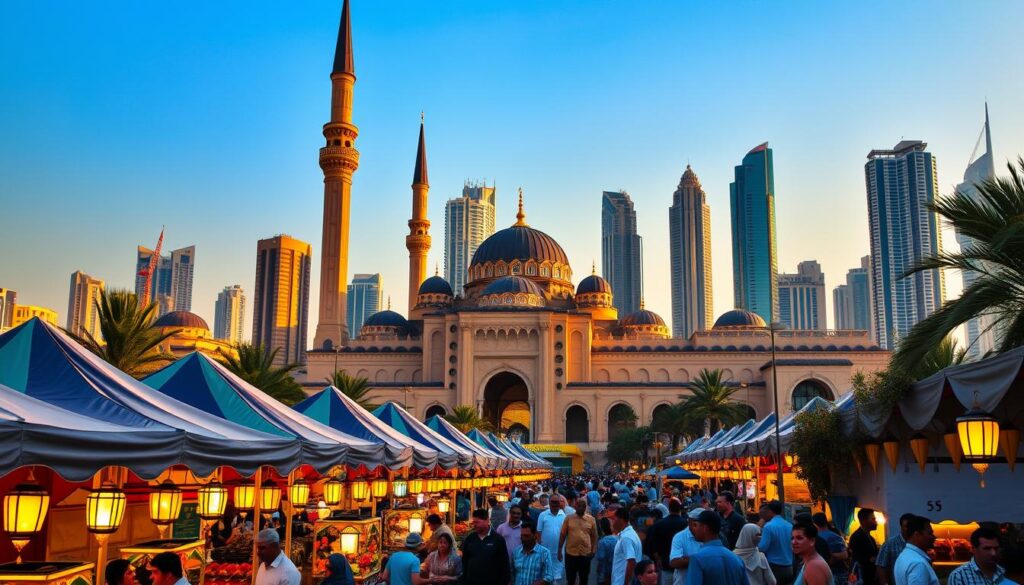
When you experience Eid in Dubai, you’ll see a mix of spiritual and modern excitement. The city buzzes with special activities that highlight Ramadan and Eid’s warmth.
What Happens During Eid
Eid celebrations include several key traditions:
- Special morning prayers at mosques across the city
- Family gatherings and festive meals
- Exchanging gifts and sweet treats
- Children receiving Eidi (monetary gifts)
Key Events and Festivities
Dubai hosts exciting events during Eid:
| Event Type | Location | Highlights |
|---|---|---|
| Fireworks Display | Burj Khalifa | Spectacular light show |
| Cultural Festivals | Dubai Mall | Traditional performances |
| Family Carnivals | Multiple City Locations | Entertainment for all ages |
Special Prayers and Gatherings
Religious observances are at the heart of Eid celebrations. Thousands gather for Eid Salah (special prayers) at mosques and open prayer grounds. These moments show the deep spiritual connection during this sacred time.
Whether you’re a visitor or resident, Eid in Dubai is an unforgettable experience. It’s a time of community, tradition, and joy.
Dress Code During Ramadan and Eid
Understanding Dubai’s dress code during Ramadan is key. It shows respect for local customs. Your clothes can greatly affect your trip, so knowing what to wear is important.
In Dubai during Ramadan, dress modestly and be aware of the culture. The weather is warm, and the religious events require careful clothing choices. You want to respect the traditions and stay cool.
Appropriate Outfits for Ramadan
- Choose loose-fitting clothes that cover shoulders and knees
- Opt for lightweight, breathable fabrics like cotton and linen
- Avoid tight or revealing clothes in public
- Neutral and muted colors are best
Dress Code for Eid Celebrations
Eid celebrations are a time to dress up and have fun. You can wear colorful and traditional clothes. It’s a chance to show your festive spirit.
| Occasion | Men’s Attire | Women’s Attire |
|---|---|---|
| Daytime Prayers | Crisp white or light-colored kandura | Long, elegant abaya with subtle embellishments |
| Evening Celebrations | Traditional kandura with decorative details | Colorful, flowing dresses or embroidered abayas |
Respecting local customs and dressing right will show your cultural awareness. It will also make your trip to Dubai during Ramadan and Eid better.
Tips for Tourists Visiting During Ramadan
Traveling to Dubai during Ramadan needs careful planning and respect for local customs. Understanding the local ways and the spiritual value of this month can make your trip rewarding. These tips will help you enjoy Dubai’s Ramadan atmosphere with confidence and respect.
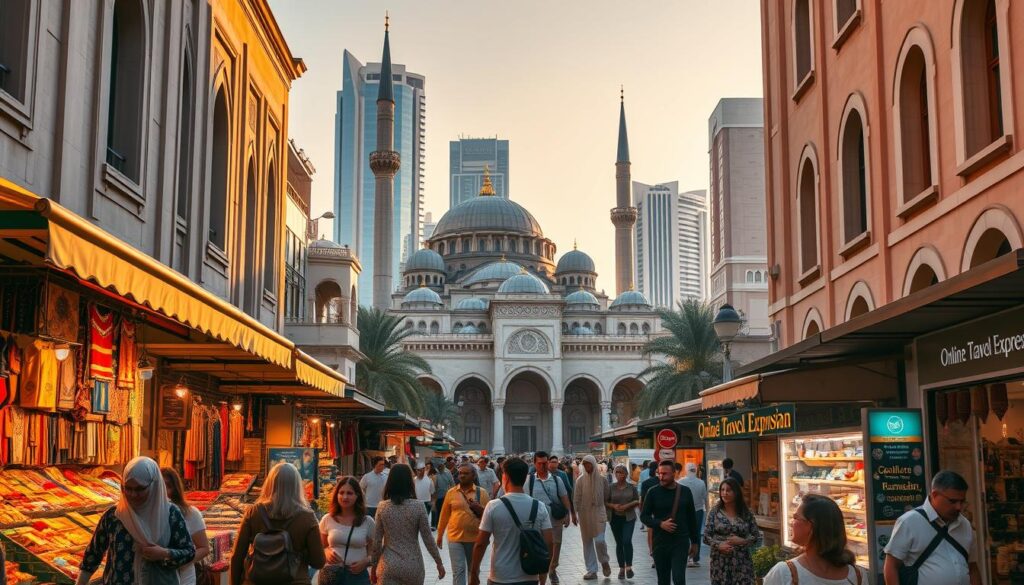
Knowing the local scene is key for visitors during Ramadan. This time offers a unique chance to see Dubai’s culture while being respectful.
Understanding Local Laws and Customs
Dubai has rules during Ramadan that tourists must follow:
- Avoid eating or drinking in public during daylight hours
- Dress modestly in conservative clothing
- Refrain from loud music or disruptive behavior
- Be patient with reduced business hours
Timing Your Activities
Planning your activities wisely can make your trip better during Ramadan. Here are some tips:
- Plan outdoor activities during cooler morning or evening hours
- Schedule meals around iftar times
- Check attraction and restaurant operating hours in advance
Being Respectful and Courteous
Showing respect can greatly improve your experience. Here’s how to be respectful:
- Learn basic Arabic greetings
- Ask permission before photographing individuals
- Understand local etiquette
“Respect is the bridge that connects travelers with local communities.”
By following these tips, you’ll make lasting connections and have a true Dubai experience during Ramadan.
Family-Friendly Activities During Ramadan
Ramadan in Dubai is a special time for families. It’s filled with fun and learning activities for kids. The city comes alive with lots of things to do for families and kids.
Dubai has many kid-friendly activities during Ramadan. These activities are both fun and educational. They help families learn and have a great time together.
Engaging Cultural Workshops for Children
Children can join special Ramadan workshops. These workshops are interactive and teach kids about Ramadan’s cultural importance. They include:
- Traditional art and craft sessions
- Islamic calligraphy classes
- Storytelling events about Ramadan traditions
- Cooking workshops featuring traditional Emirati cuisine
Educational Programs and Family Experiences
Dubai’s museums and cultural centers have special Ramadan programs. The Sheikh Mohammed Centre for Cultural Understanding offers tours and sessions. They help families learn about Emirati heritage.
- Family-friendly mosque tours
- Cultural heritage presentations
- Interactive history lessons
- Traditional games and storytelling
These activities help families make lasting memories. They also give a deeper look into Dubai’s cultural traditions during Ramadan.
Navigating Transportation in Dubai During Ramadan
During Ramadan, getting around Dubai needs some careful planning. Public transit hours change to fit religious times. So, you’ll need to adjust your travel plans and expectations.
The Dubai Metro and buses run on special hours, especially around prayer times and Iftar. Your travel plans should be flexible and well-thought-out. Uber and Careem are good choices for rides. Taxis are also available, but expect delays at sunset when many people are heading home.
Use the RTA Dubai app to keep up with schedule changes. Traffic gets really bad before Iftar, so leave early. Try to avoid traveling from 5-7 PM when roads get very crowded.
Traveling early in the morning or late at night is best. Public transport is less busy then. Always be patient and polite while moving around Dubai during Ramadan.

